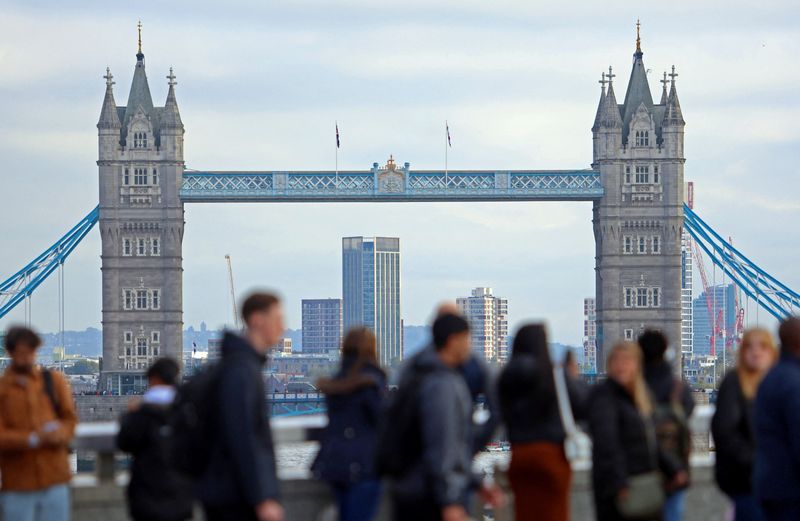
©Reuters. FILE PHOTO: People walk on London Bridge looking at the view of Tower Bridge in the City of London financial district in London, Britain, October 25, 2023. REUTERS/Susannah Ireland/File Photo
By David Milliken and Suban Abdulla
LONDON (Reuters) – In the three months to the end of January, British wages excluding bonuses grew at the slowest pace since October 2022, while the unemployment rate rose unexpectedly, according to data that may slightly ease concerns about Bank of England inflation.
Regular wages growth fell to 6.1% in the three months to January from 6.2% in the final quarter of 2023, the Office for National Statistics said.
Economists had expected another figure of 6.2%.
The unemployment rate rose to 3.9% from 3.8%, reversing a decline seen in the final quarter of last year, although the ONS is still reviewing its household survey.
The pound weakened against the US dollar and the euro soon after the release of the labor market data.
The ONS said on Monday there was more uncertainty than usual over the unemployment rate, of around 0.1 percentage point in either direction, due to a problem with its analysis of jobs data from Northern Ireland. North.
The BoE has identified wage growth and service price inflation as the two most important indicators for whether underlying inflationary pressures are easing enough to allow it to cut interest rates.
Wage growth is about double what it was before the Covid-19 pandemic, when inflation was close to the 2% target.
While some senior BoE officials expect wage growth to decline as overall inflation falls, others worry that labor shortages due to the pandemic will make this process slow.
“Today’s data is unlikely to justify a major policy change by the Bank of England, particularly with wage growth still robust and ongoing concerns it could lead to persistent price pressure,” said Yael Selfin, chief economist at KPMG UK.
“However, we expect the labor market to weaken in the coming months, which should reduce the momentum of wage growth and raise the prospect of interest rate cuts from the summer onwards.”
Catherine Mann, the BoE policy-setter, who has called for further increases in borrowing costs, said on Monday that there was still “a long way” to go for inflation pressures to be consistent with the central bank’s 2% target .